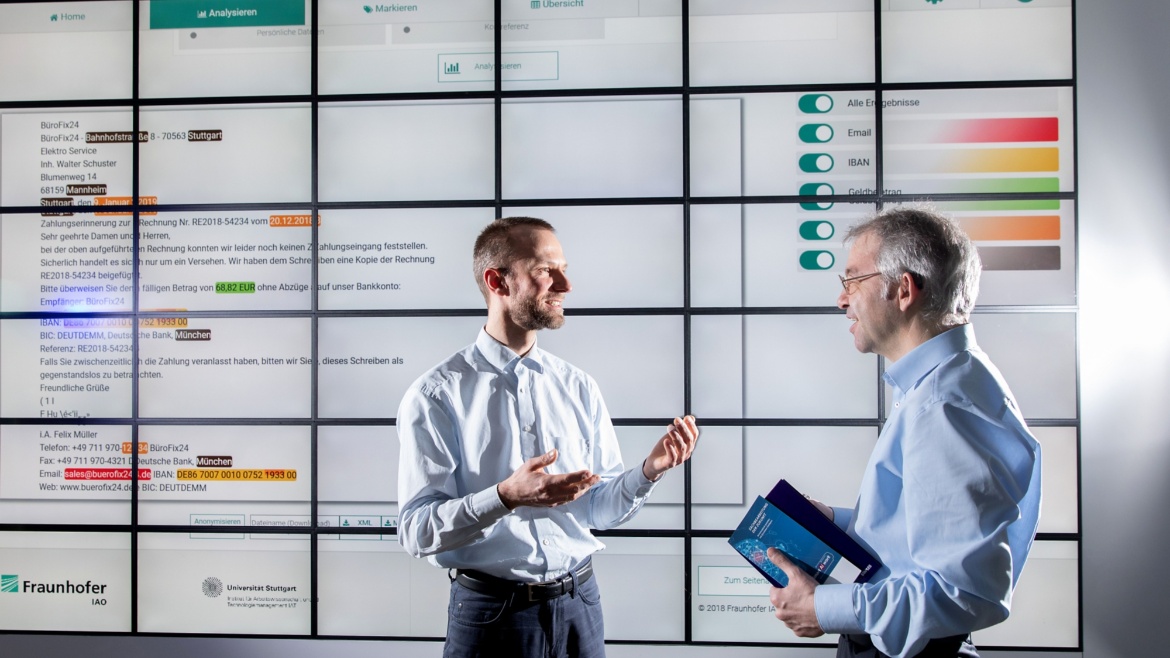
- Publications of "SmartAIwork" [de]
July 13, 2021
It’s the same every day: the working life of many clerks is determined by routine. According to Helmut Zaiser and Tobias Müller from the University of Stuttgart’s Institute of Human Factors and Technology Management (IAT), there is an urgent need to investigate the extent to which Artifi cial Intelligence (AI) can be employed benefi cially in this area, which is the starting point of the “SmartAIwork” project.
Together with the Fraunhofer Institute for Industrial Engineering IAO and seven other partner organizations, the two IAT scientists Helmut Zaiser and Tobias Müller are investigating the meaningful use of AI in processing and administration. They are investigating how AI-supported work can be made more productive and human-friendly, challenging but not overly strenuous. “SmartAIwork” is a joint project funded by the Federal Ministry of Education and Research (BMBF) under the “Innovations for Tomorrow's Production, Work and Services” program.
In the first step of the three-year project, the scientists analyzed the effects of the use of AI in processing and administration tasks and created studies. They will then implement the knowledge gained in pilot projects in three project partner companies. In the final step, Zaiser and Müller’s team will create action and orientation aids for the future use of AI, and develop research and development recommendations for politics, research and practice.

AI in public transport complaints management
Zaiser and Müller have already described a concrete idea for the use of AI for one of their project partners, which involves complaints management at a local public transport company (ÖPNV). Many customers complain every day about unpunctual buses, lack of cleanliness at bus stops or the driving style. The clerk first has to sort the topics and forward them to the relevant department. “A program could take over this categorization task thus lessening the workload,” says Müller. And, thinking ahead, the AI system could also pre-formulate a suitable response to the customer and suggest it to the employees. Routine queries could be answered more quickly, leaving staff with more time for more demanding tasks, such as dealing with more research-intensive queries. “That's our vision for using AI as a support system.”
The range of tasks still performed by hand, even when the technical means of digital processing already exist is really quite shocking.
Tobias Müller
But before it gets to this stage, Zaiser and Müller are still facing a major challenge: in small and medium- sized enterprises, they say, the digitization of work steps has often been lacking so far. “The range of tasks still performed by hand, even when the technical means of digital processing already exist is really quite shocking,” says Müller. “AI engines are fueled by data, so the basic digitalization of processing tasks is a prerequisite - yet this has not yet happened.”
AI has the potential to automate knowledge sector tasks. However, it can also be used to support work that promotes innovation and competence. “AI is not intended to replace clerks, but to support them and relieve them in their day-to-day work routines,” says Zaiser. The use of AI should serve to modify jobs in these sectors such that the work becomes more productive and innovative. “Man and machine go hand in hand”, is how Müller sums up AI's objective in processing and administration.
Bettina Künzler

